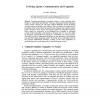514 search results - page 28 / 103 » Cognitively Plausible Models of Human Language Processing |
111
click to vote
COGSCI
2002
15 years 2 months ago
2002
We address the problem of predicting how people will spontaneously divide into groups a set of novel items. This is a process akin to perceptual organization. We therefore employ ...
142
click to vote
ESSLLI
2009
Springer
15 years 19 days ago
2009
Springer
We present an implemented model for speech recognition in natural environments which relies on contextual information about salient entities to prime utterance recognition. The hyp...
141
click to vote
AISADM
2005
Springer
15 years 8 months ago
2005
Springer
Computer programming of complex systems is a time consuming effort. Results are often brittle and inflexible. Evolving, self-learning flexible multi-agent systems remain a distant ...
131
click to vote
EMNLP
2009
15 years 19 days ago
2009
Information Extraction (IE) systems that extract role fillers for events typically look at the local context surrounding a phrase when deciding whether to extract it. Often, howev...
116
click to vote
ATAL
2010
Springer
15 years 4 months ago
2010
Springer
The primary target of this work is human-robot collaboration, especially for service robots in complicated application scenarios. Three assumptions and four requirements are ident...

